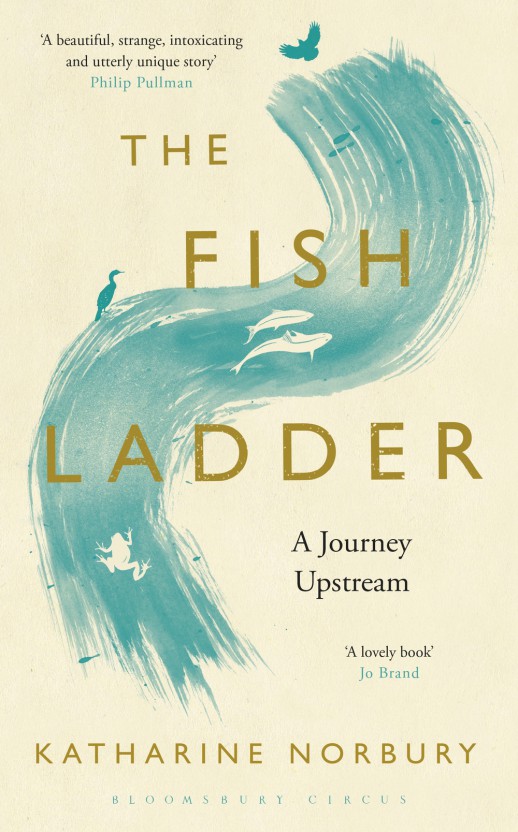Katharine Norbury; The Fish Ladder: A Journey Upstream
Bloomsbury Publishing, 304 pages, hardback
Review by Melissa Harrison
One of the many reasons to be excited about Katharine Norbury’s The Fish Ladder: a journey upstream is that so much of our literature about nature and landscape currently comes from male writers – and so it is particularly refreshing to hear a woman’s voice exploring and thinking about place, and in a different way. The genre is in rude health, bursting at the seams with brilliant work, but it’s hardly contentious to point out that it doesn’t yet reflect society at large. To illustrate: when I was asked to review the best nature books of the year, as I was by The Times in 2014, I had 20 or so books by men to choose from, and only one by a woman.
The reasons for the imbalance are complex and historical, and may well include the greater difficulty women face (or believe we face) in simply getting out there and walking, in the way that Norbury does – but I think there’s more to it, too. Cultural forms of all types look the way they do because they have been shaped quite naturally, over time, by the interests and preferences of their proponents. But those preferences can become self-perpetuating as uncanonical ways of contributing – ways that don’t ‘fit’ – are tacitly excluded or ignored. And if a genre’s proponents are unrepresentative of society we can find ourselves judging a work ‘good’ or ‘bad’ based on a template that’s been limited right from the start, rather than questioning or broadening the template itself.
Why does any of this matter? Because the knowledge of a genre’s make-up can alter people’s creative practice: I have felt the pressure to be more ‘male’ in my work (which I perceived to mean more objective, and less personal), and at one point I even considered writing as ‘M. Z. Harrison’ and concealing my gender entirely – something I’m very glad, now, that I didn’t do. Far worse, though, is the danger that women or minority writers who might have had a new or unusual contribution to make to nature writing can feel discouraged from adding their voice altogether, continuing the under-representation. ‘You can’t be what you can’t see’, as the saying goes.
But we need new voices, and voices that don’t fit; it’s how literature lives and breathes and grows. Nan Shepherd left the manuscript of her extraordinary work of landscape writing, The Living Mountain, in a drawer for 30 years after her friend and fellow writer Neil Gunn told her that it was unlikely to find a readership; as beautiful as it was, it was so very different to the kind of books that were being published at the time. It’s taken 70 years, and the cultural authority of Robert Macfarlane, for us to understand what an important text The Living Mountain actually was, and he has written and spoken with great insight about the ways in which Shepherd’s approach to landscape differs from that of a male writer’s, and (most importantly) the value in her differing approach. For instance, she said that she did not travel ‘up’ a mountain, to conquer its summit, but ‘into’ one, both geographically and imaginatively – and the differences do not end there. I believe that women have an important contribution to make to nature writing and landscape literature, and that we all miss out by not having more of them.
Which brings me to The Fish Ladder, a book that combines memoir with nature writing and benefits from a quietly gynocentric outlook that really shouldn’t seem as daring, in 2015, as it still does. Norbury, who was given up for adoption soon after her birth, describes how she sets out in mid-life, with her young daughter Evie, to trace the course of a river from sea to source, and how she learns, while doing so, about her birth parents. Candid, subjective, and rooted in the body, it opens with a miscarriage and takes in cancer and debilitating depression; like a river, it meanders and digresses, reaches dead-ends and goes back on itself; and its exploration of motherhood – particularly Norbury’s relationship with Evie, and with the mother who brought her up – is achingly poignant.
Norbury has a keen nature-lover’s eye, and a gift for description: a flock of knots seems to vanish against the sky and then reappear ‘with the slight tilt of a Venetian blind’; fox cubs, with faces ‘as neat as party sandwiches’, bounce down a hillside, ‘hot loaves knocked out of their tins’. The book explores a range of landscapes, from the classically beautiful (the Scottish highlands, the Welsh coastline) to the less orthodox (the Liverpool docks, the Humber estuary), and there is a great deal to admire in her exacting evocation of these places – and in her emotional honesty, too. The Fish Ladder is a sui generis achievement, quite different in its qualities from much of the company it is about to join – and all the more impressive for it.
The fact is that when it comes to a shared cultural understanding of place, landscape and nature, we aren’t yet hearing all our available voices. As well as a more representative proportion of women writers I’d like to see a rich tradition of black, Asian and migrant literature about the UK countryside, and hear more queer and transgender narratives, too. But for that to happen, we need sometimes to set aside what ‘fits’ or feels familiar, and instead be open to those who bring something new to the table, as Norbury does in her unique memoir; because being able to connect with a fuller range of human experiences enriches the entire genre, and enriches us as readers, too.
The Fish Ladder: A Journey Upstream is available for pre-order in the Caught by the River shop, priced £15
